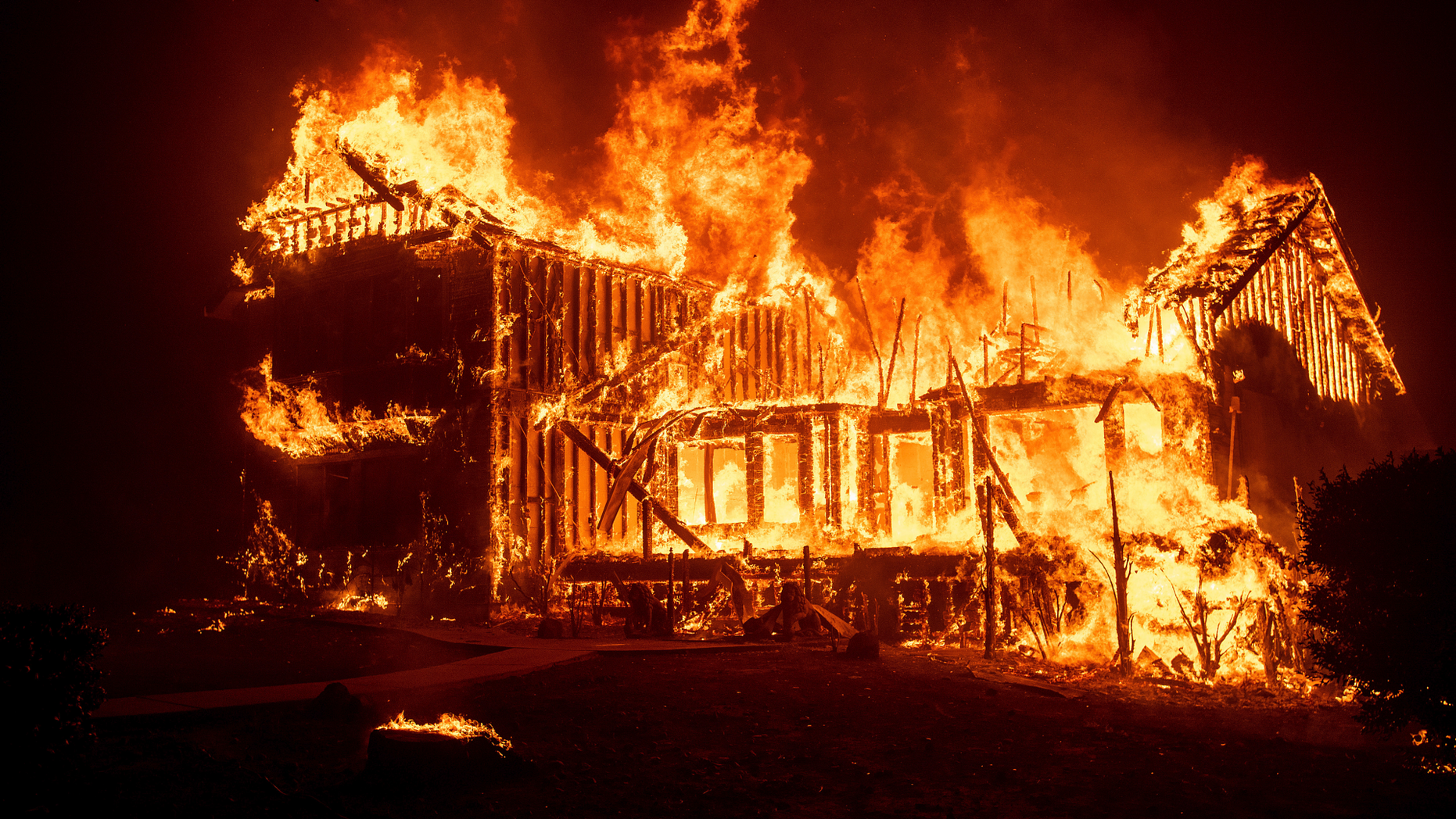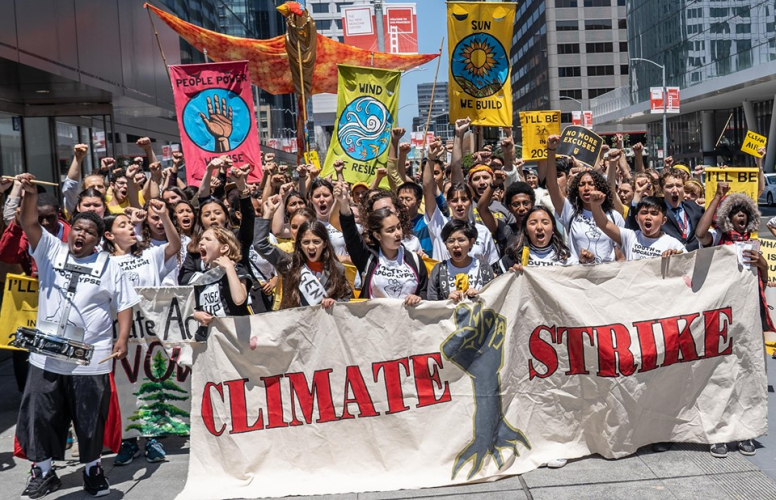
How to cope with ‘eco anxiety,’ according to mental health professionals
Ryan Kost / The San Francisco Chronicle
(October 3, 2019) — We go to therapy because we are depressed. Or manic. Or both. We go because work is stressful and we need help coping. We go because we need guidance on navigating relationships — platonic, romantic or anywhere in between.
And more and more, we go to therapy because it feels like the world is ending and there’s nothing we can do. The Internet has dubbed this feeling “eco anxiety.”
Most of Jennifer Machado’s clients bring up climate change — and all the associated impacts — during their sessions with her. Machado, a Bay Area psychotherapist, says she really started to notice the anxiety about global warming last summer.
For the second year in a row, wildfires were devastating Northern California, killing dozens and tearing apart entire towns. Many miles away people choked on the smoke as the sky turned an unimaginable yellow. If they left their houses, they held masks to their faces. “Some clients were really in a state of panic about that,” she says. “Just how to navigate that as an ongoing thing that was happening.”
But it’s more than just the fires, she says. People ask her about financial planning and how to prepare for what’s to come. They talk to her about not having kids, about there being no future to look forward to. “It seems to be happening at a mass scale,” she says. “There’s this narrative of ‘What does my life mean?’ There just seems to be this sense of chaos and loss.”
Some leaders in the fields of psychology and therapy have seen this crisis coming for years, and bit by bit they’ve been pushing colleagues to understand that environmental degradation is central to our mental health.

A home burns as the Camp Fire rages through Paradise, Calif. (Photo: Fox News)
“We’ve been in a dysfunctional relationship with nature, so to speak,” says psychologist Elizabeth Allured, co-president of Climate Psychology Alliance North America, a group that works to bring awareness to the mental health implications of climate change. And just like any relationship, “we don’t often like to feel vulnerable … and vulnerability is getting in the way of us waking up to what’s happening in the environment.”
The connection is self-evident, Allured says. She realized it in the late ’50s and early ’60s when her family moved to Southern California. This was before the Clean Air Act, when ozone alert days were common, and children were told to stay indoors. Sometimes, she’d sneak out and go running around the yard. “It would be so painful in my lungs. It affected my mood.” When she was 9, she went to a sleep-away camp and found herself in a “functioning ecosystem.”
“I was so happy to be in this place that smelled good; the sounds of all the birds,” she says. “It never quite left me.”
Like Machado, she’s hearing from more patients that the changing environment is on their minds. Adolescents, she says, are particularly anxious about the future. Some want to know whether she thinks climate change can be stopped. Allured makes it her “business to read up on climate change,” but, she says, many psychologists and therapists aren’t prepared to talk about the issue. Her group, along with the aptly named Climate Psychiatry Alliance, recently announced the creation of a registry for what they’re calling climate-aware providers.
For more than a decade, the American Psychological Association has been studying how psychology can help in understanding and addressing climate change. In 2017, the association, along with two climate awareness groups, Climate for Health and ecoAmerica, issued a 69-page report detailing the various mental health impacts of broad global climate change.
The list is long: depression, stress, anxiety, strains on social relationships, complicated grief, substance abuse, post-traumatic stress disorder, loss of personal identity, helplessness and fatalism.
Climate change hits in three main waves, says Susan Clayton, a co-author of the report. On the most basic level, a person might deal with PTSD after surviving a traumatic, climate-related event, say a wildfire or a hurricane. Next would be more generalized climate patterns that wear on us — longer, colder winters for some; longer, hotter summers for others. The rate of suicides, for instance, is known to go up during heat waves, as do mental health admissions to hospitals. Finally, is the existential toll, simply “knowing that climate change is happening” and our world is going to be forever different.
That last one is sometimes the hardest to resolve, especially if a client or patient hasn’t fully come to terms with the fact that it might be affecting how they feel on a day-to-day basis.
Leslie Davenport, a psychotherapist who splits her time between San Francisco and Tacoma, Wash., has opted for asking a question during intake: How are you feeling about what’s happening in the world? Some shrug off the question, but for others it reveals new areas to explore.
“I’m just trying to open the door,” Davenport says. “The majority of the responses are appreciative because this is something people are feeling more and are willing to talk about more.”

Demonstrators hold signs during the Climate Strike March in San Francisco on September 20, 2019. (Photo: The Chronicle)
Two years ago, Davenport published a book called “Emotional Resiliency in the Era of Climate Change.” She wanted people working in the mental health field to “speak the language” of climate psychology.
As the title implies, resiliency is a big piece of how Davenport sees us moving through the difficulties ahead. More resilience, she says, means a “growing capacity to be present.”
Clayton mentioned the term “resilient,” too. In fact all four of the professionals struck similar notes on the best way to help patients and clients address an issue that’s not going away: They encourage people to talk about it, of course, to reach out and build community with others, to ditch known stressors — social media and dire news feeds, for instance. And most of all, they say, get involved. Green your workplace, attend marches, push for climate change curriculum at schools.
“Activism,” says Davenport, “is a therapeutic intervention.”
Ryan Kost is a San Francisco Chronicle staff writer. Email: rkost@sfchronicle.com. Twitter: @RyanKost
Posted in accordance with Title 17, Section 107, US Code, for noncommercial, educational purposes.